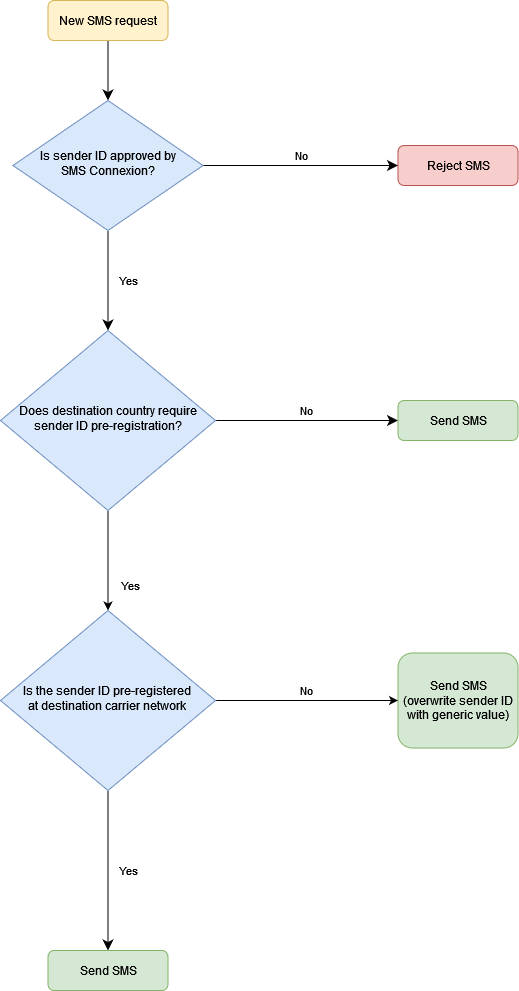Kunskapscentrum
Utforska vårt bibliotek med information om våra produkter och tjänster
What is a sender name or sender ID?
In SMS messaging, a sender name (sender ID or originator) is a name that appears as the message sender on recipients' devices. Sender names are a useful way to identify yourself to the recipients of your messages.
What kind of sender names are there?
A sender name may consist of any of the following::
- Alphanumeric: when sending one-way SMS messages to compatible countries and carriers, you can set your company name or brand as the sender ID. This can be any word with up to 11 letters, like "MyCompany." Because of the GSM standard, the alphanumeric sender ID can only have 11 characters
- Short Code: a number with only five or six digits, depending on the country. These numbers are able to send and receive text messages to and from mobile devices. They are frequently used for marketing and promotional communications. Short codes are not immediately available and require an application process. Short codes are also country-specific, so you can't use them to send and receive SMS messages from people outside of your country
- Long number:you can use a phone number or a landline number. This allows folks to reply to your mobile phone number or call your landline. Adding a mobile number is clearly better so that you don't miss any SMS text responses
Sender ID support varies by country based on local carrier requirements. For instance, carriers in the United States do not allow sender IDs at all, whereas carriers in India mandate the usage of sender IDs.
See supported countries for a full list of all the countries that support sender IDs.
Important: Some countries demand the registration of sender IDs prior to their use. This registration process could take several weeks, depending on the country. The countries requiring pre-registered sender names are listed in a table on the page for supported countries.
Sender IDs must be registered and managed separately for each country, which can be a time-consuming operation when sending communications SMS to many countries. However, SMS Connexion makes the process easier by allowing you to manage all pre-registrations of sender IDs from the Dashboard, reuse authorisation letters and paperwork, and monitor the progress in real time.
Note: that if you are sending messages to users in a country that supports sender IDs but does not require you to register your sender ID, you do not need to take any additional actions. You can immediately begin sending messages with the desired sender ID after approval from SMS Connexion.
Alphanumeric sender ID
An alphanumeric sender ID can be a crucial component of successful SMS campaigns, as it can contribute in building client confidence and encourage higher interaction with your messages.
When you receive a SMS message from a known sender, you are more likely to open and read it.Customers who agreed to get your messages should recognize your sender ID and think of your brand when they see it.This is essential for building trust and increasing the likelihood that they will open future messages.
Note: Messages sent from an Alphanumeric Sender ID cannot be replied to, as they can only be sent in one direction. For a reply, you need a short code or a virtual long number.
When possible, SMS Connexion will try to deliver messages with your sender ID. Please be aware, however, that we are unable to guarantee that messages will be delivered using the Sender ID you have chosen to use. In countries that do not support alphanumeric sender IDs, SMS Connexion delivers SMS messages utilizing short codes, long numbers, or other supported origination numbers.
Even if you are sending SMS to a country that doesn't require you to register your sender ID, SMS Connexion still needs to approve your sender ID. This measure is in place as a safety precaution to avoid SMS abuse from happening. The approval process of a sender ID takes between one and a few hours.
Advantages of sending messages with alphanumeric sender ID
Increased message deliverability: To stop unwanted messaging, regulatory authorities in many countries are getting better at filtering out unauthorised A2P SMS use cases. For each Alphanumeric Sender ID request, SMS Connexion goes through a careful registration process with the local telecommunications carrier.
Better brand recognition: When you use an Alphanumeric Sender ID, people will see your name with every SMS you send. This strengthens your brand.
Higher open rates: As spam and scams become more frequent, being able to quickly identify the sender is a crucial part of whether or not a message is opened. If the sender is a phone number from another country or an unknown number, the message almost never gets opened. With alphanumeric Sender IDs, the receiver knows right away who sent the message and that it is authentic. This makes it up to 80% more likely that they will open the message.
Which countries use alphanumeric sender IDs?
This page shows which countries support Alphanumeric Sender IDs.
How much does it cost to get an alphanumeric sender ID?
Most countries don't charge extra o use an Alphanumeric Sender ID. But for countries that require pre-registration, there may be extra fees, like one-time setup fees or monthly recurring fees.If so, that information will be shown on the country's Sender ID registration form.
Alphanumeric Sender ID Limitations
- Some countries don't support alphanumeric Sender IDs, and some countries that do support them need you to sign up ahead of time
- Alphanumeric Sender IDs can only be used for one-way messages, recipients can't reply to messages directly (but if you want people to respond, you can include contact information in your message)
- Certain use situations are typically forbidden (e.g. spam, phising, adult content, dating sites and any content that violates the law or infringes on intellectual property)
- Some countries don't allow certain uses, which are listed in the SMS Guidelines
Requirements for Formatting an Alphanumeric Sender ID
Alphanumeric Sender IDs can have up to 11 characters of the following types:
- uppercase letters A -Z
- lowercase letters a through z
- numbers 0 through 9
- spaces
Alphanumeric Sender IDs have to contain at least one letter. You can't use special characters or punctuation.
Flowchart diagram for step-by-step SMS sender ID verifications

